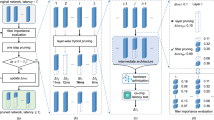Abstract
Traffic classification is an essential part of network management and monitoring, and has been widely used to help improve security and detect anomalies. Convolutional neural networks (CNN) have shown good performance for many of these traffic classification tasks, at the cost of a heavy computational burden. To efficiently classify incoming packets, hardware accelerators such as FPGAs, which are integrated with smart network cards, can provide the required parallelism with energy efficiency to execute such CNNs. Optimization techniques such as pruning can further improve inference speeds at the cost of some accuracy, but are usually static (i.e., cannot change after deployment). Given that, this work implements an adaptive framework to process different traffic classification tasks efficiently. It works by generating multiple pruned CNN hardware models during design time; and at run-time exploits the accuracy vs throughput trade-off of pruning by dynamically and automatically switching between the pre-generated models according to the number of incoming packets and the different classification tasks at a given moment. Compared to the regular (static) solution, our implementation improves the Quality of Experience up to \(1.14\times \), executing up to \(1.51\times \) more inferences and improving energy efficiency per inference up to \(1.35\times \).
Access this chapter
Tax calculation will be finalised at checkout
Purchases are for personal use only
Similar content being viewed by others
References
Aceto, G., Ciuonzo, D., Montieri, A., Pescapè, A.: Mobile encrypted traffic classification using deep learning: experimental evaluation, lessons learned, and challenges. IEEE Trans. Netw. Serv. Manag. 16(2), 445–458 (2019)
Blott, M., et al.: FINN-R: an end-to-end deep-learning framework for fast exploration of quantized neural networks. ACM Trans. Reconfigurable Technol. Syst. 11(3), 1–23 (2018)
Boutaba, R., et al.: A comprehensive survey on machine learning for networking: evolution, applications and research opportunities. J. Internet Serv. Appl. 9(1), 1–99 (2018). https://doi.org/10.1186/s13174-018-0087-2
Choudhary, T., Mishra, V., Goswami, A., Sarangapani, J.: A comprehensive survey on model compression and acceleration. Artif. Intell. Rev. 53(7), 5113–5155 (2020). https://doi.org/10.1007/s10462-020-09816-7
Draper-Gil, G., Lashkari, A.H., Mamun, M.S.I., Ghorbani, A.: Characterization of encrypted and VPN traffic using time-related features. In: Proceedings of the 2nd International Conference on Information Systems Security and Privacy, pp. 407–414. SCITEPRESS - Science and Technology Publications, Rome, Italy (2016)
Elnawawy, M., Sagahyroon, A., Shanableh, T.: FPGA-based network traffic classification using machine learning. IEEE Access 8, 175637–175650 (2020)
Fang, B., Zeng, X., Zhang, M.: NestDNN: resource-aware multi-tenant on-device deep learning for continuous mobile vision. In: MobiCom, pp. 115–127 (2018)
Han, S., Pool, J., Tran, J., Dally, W.J.: Learning both weights and connections for efficient neural networks. In: NIPS, pp. 1135–1143 (2015)
Kang, W., Kim, D., Park, J.: DMS: dynamic model scaling for quality-aware deep learning inference in mobile and embedded devices. IEEE Access 7, 168048–168059 (2019)
Korol, G., Jordan, M.G., Rutzig, M.B., Beck, A.C.S.: Synergistically exploiting CNN pruning and HLS versioning for adaptive inference on multi-FPGAs at the edge. ACM Trans. Embed. Comput. Syst. 20(5s), 1–26 (2021)
Korol, G., Jordan, M.G., Rutzig, M.B., Beck, A.C.S.: AdaFlow: a framework for adaptive dataflow CNN acceleration on FPGAs. In: DATE, pp. 244–249. IEEE (2022)
Li, H., Kadav, A., Durdanovic, I., Samet, H., Graf, H.P.: Pruning filters for efficient convnets. In: ICLR (2017)
Lockwood, J.W., McKeown, N., Watson, G., et al.: NetFPGA–an open platform for gigabit-rate network switching and routing. In: MSE, pp. 160–161. IEEE Computer Society (2007)
Pappalardo, A.: Xilinx/Brevitas (2021). https://doi.org/10.5281/zenodo.3333552
Tong, D., Qu, Y.R., Prasanna, V.K.: Accelerating decision tree based traffic classification on FPGA and multicore platforms. IEEE Trans. Parallel Distrib. Syst. 28(11), 3046–3059 (2017)
Wang, W., Zhu, M., Wang, J., Zeng, X., Yang, Z.: End-to-end encrypted traffic classification with one-dimensional convolution neural networks. In: 2017 IEEE International Conference on Intelligence and Security Informatics (ISI), pp. 43–48. IEEE, Beijing, China (2017)
Xu, Z., Yu, F., Liu, C., Chen, X.: Reform: static and dynamic resource-aware DNN reconfiguration framework for mobile device. In: DAC, pp. 1–6 (2019)
Zhang, W., Wang, J., Chen, S., Qi, H., Li, K.: A framework for resource-aware online traffic classification using CNN. In: CFI, pp. 5:1–5:6. ACM (2019)
Acknowledgements
This study was financed in part by Coordenação de Aperfeiçoamento de Pessoal de Nível Superior - Brasil (CAPES) - Brazil - Finance Code 001, São Paulo Research Foundation (FAPESP) grant #2021/06825-8, FAPERGS and CNPq.
Author information
Authors and Affiliations
Corresponding author
Editor information
Editors and Affiliations
Rights and permissions
Copyright information
© 2023 The Author(s), under exclusive license to Springer Nature Switzerland AG
About this paper
Cite this paper
Vicenzi, J.C., Korol, G., Jordan, M.G., Rutzig, M.B., Filho, A.C.S.B. (2023). Adaptive Inference on Reconfigurable SmartNICs for Traffic Classification. In: Barolli, L. (eds) Advanced Information Networking and Applications. AINA 2023. Lecture Notes in Networks and Systems, vol 654. Springer, Cham. https://doi.org/10.1007/978-3-031-28451-9_12
Download citation
DOI: https://doi.org/10.1007/978-3-031-28451-9_12
Published:
Publisher Name: Springer, Cham
Print ISBN: 978-3-031-28450-2
Online ISBN: 978-3-031-28451-9
eBook Packages: Intelligent Technologies and RoboticsIntelligent Technologies and Robotics (R0)




